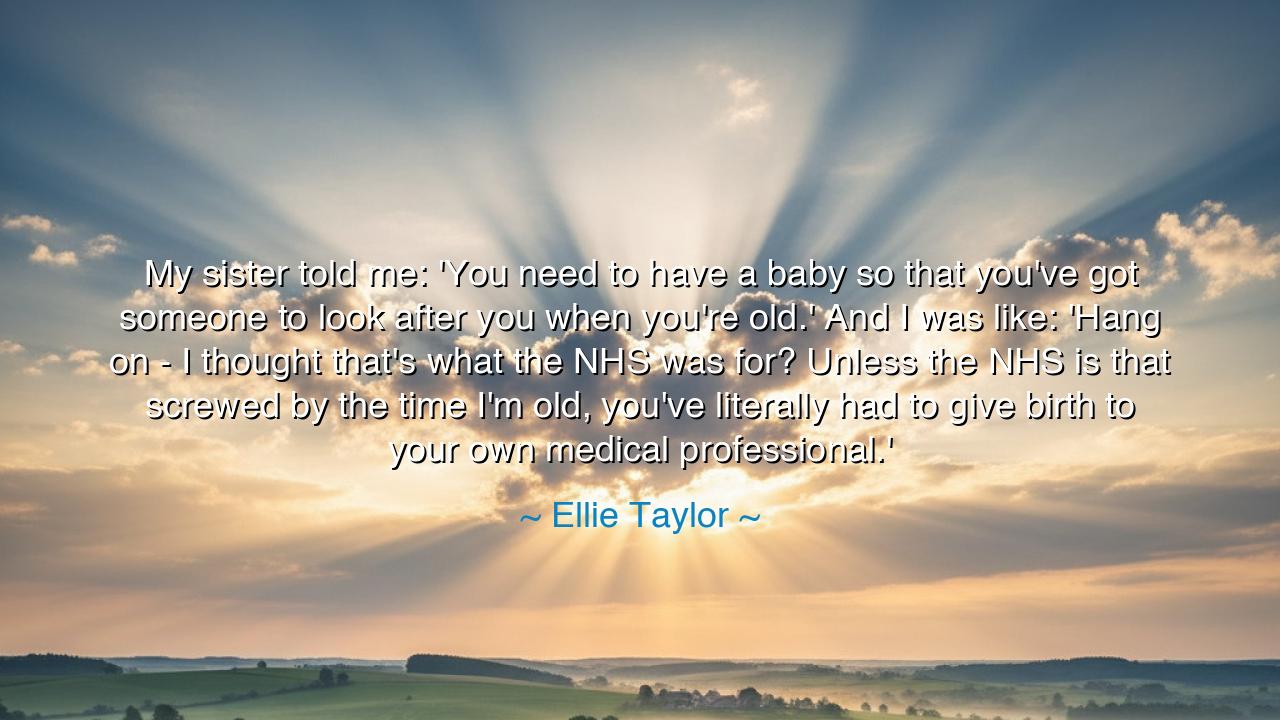
My sister told me: 'You need to have a baby so that you've got
My sister told me: 'You need to have a baby so that you've got someone to look after you when you're old.' And I was like: 'Hang on - I thought that's what the NHS was for? Unless the NHS is that screwed by the time I'm old, you've literally had to give birth to your own medical professional.'






“My sister told me: ‘You need to have a baby so that you’ve got someone to look after you when you’re old.’ And I was like: ‘Hang on — I thought that’s what the NHS was for? Unless the NHS is that screwed by the time I’m old, you’ve literally had to give birth to your own medical professional.’”
Thus spoke Ellie Taylor, a voice of wit and reason, whose humor hides a deeper reflection on the modern condition. Her words, though spoken in jest, strike at the heart of a profound and timeless question — who will care for us when we can no longer care for ourselves? In this quote lies not only the laughter of irony but also the trembling of truth, for she speaks from a world where the bonds of family, community, and public trust are all being tested.
At first glance, her remark seems a light-hearted exchange between sisters, but beneath the jest is an echo of anxious realism — the fear that society’s institutions, once built to safeguard the weak and the aging, may falter under their own strain. When she mentions the NHS — the United Kingdom’s National Health Service — it is not merely a joke about bureaucracy; it is a lament, wrapped in laughter, about the fragility of systems upon which millions depend. Through humor, she reveals the uncomfortable truth: that the promises of civilization are only as strong as the compassion that sustains them.
To “give birth to your own medical professional” — the final sting of her jest — is an image both comical and tragic. It evokes a world where care is no longer a right of the citizen, but a private burden to be borne by blood. In ancient times, before welfare or medicine as we know them, such dependence was the norm: the old survived only through the devotion of their kin. Families were their own hospitals, their daughters and sons their healers. Yet Taylor’s words remind us that modern societies built great systems — like the NHS — precisely to free humanity from that fearful cycle of dependence. Her laughter, then, is a mirror held to a generation that wonders whether those hard-won gains are slowly slipping away.
There is wisdom in her satire, for the ancients, too, taught that every jest hides a truth. The philosopher Diogenes, who mocked the vanity of Athens through his outrageous humor, believed that laughter was a weapon sharper than any sword. So too does Ellie Taylor use irony not to belittle, but to awaken. Her quip reveals a paradox at the heart of modern life: though we have built towering institutions of care, our trust in them is eroding. The humor masks a quiet grief — that the promise of shared care may one day fail, leaving the vulnerable once again dependent upon family alone.
Consider the historical example of Bismarck’s Germany, where the first modern welfare state was born in the 19th century. It was built on the belief that a nation’s strength lies not only in its armies or industry, but in its ability to protect its workers, its elderly, and its sick. Yet even those early architects of social care warned that such systems must be constantly renewed by public will. When the people stop believing in their institutions — or stop supporting them — those institutions begin to decay. Taylor’s joke, though light in tone, sounds a similar warning: that society must not become complacent, lest what was once a shared shield becomes a fragile relic.
Her words also speak to the changing nature of family in the modern world. Where once children were expected to tend to their elders, today many live far from their parents, bound by careers, cities, and screens. The web of family care has thinned, and the public system must stretch to fill the void. Yet even as we rely on that system, we are also responsible for it. The laughter in Taylor’s line asks each listener — not just the British citizen, but the global one — a simple, piercing question: if we do not nurture the structures that care for us, who will?
Thus, from her jest, we may draw a lesson as old as civilization itself: that care is the foundation of humanity, and it must be tended both privately and publicly. Families must remember their duty to love, and nations their duty to protect. The wise citizen honors both — the hearth and the hospital, the kin and the community. To laugh at the failing of systems is natural; to ignore their repair is perilous.
And so, O listener, hear the wisdom beneath Ellie Taylor’s humor. Her jest may make you smile, but let it also make you think. For laughter, when born of truth, is the beginning of awakening. Cherish your families, strengthen your institutions, and never take compassion for granted. Whether care comes from a loved one’s hands or from the healer’s skill, it is the same sacred act — the preservation of life against the erosion of time. In defending that, we defend the very heart of civilization itself.






AAdministratorAdministrator
Welcome, honored guests. Please leave a comment, we will respond soon